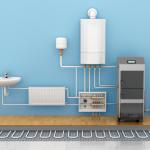
Essential Factors for Enhancing Energy Efficiency in Hot Water Systems
Understanding Energy Efficiency in Hot Water Systems
Energy efficiency in hot water systems is all about getting the maximum possible hot water output with minimum energy input. It's a crucial aspect as it not only directly impacts the cost (i.e., lower energy bills) but also helps to reduce environmental pollution by minimising energy wastage.
One pivotal factor in determining the power efficiency of a hot water system is the energy efficiency rating or EER. The higher this rating, the better is the energy efficiency. Conversely, traditional hot water systems often come with potential energy losses due to improper insulation, standby heat loss, and unnecessary heating of the whole tank.
Options for Energy-Efficient Hot Water Systems
The market brands an array of energy-efficient hot water systems, which operate on different mechanisms to save energy. They include solar, heat pump, tankless or on-demand systems. Solar hot water systems capitalise on sunlight, transforming it into thermal energy to heat water, while heat pump systems utilise outdoor air for the same. In contrast, tankless or on-demand systems heat water only when required, thus eliminating the standby heat loss.
Each system has its highs and lows, and choosing the right one hinges on factors such as home setup, climate, number of inhabitants, and certainly, budgeting for your new hot water system.
Insulation Measures for Enhanced Efficiency
Capitalising on insulation is a smart move for enhanced efficiency in your hot water system. Adequate insulation reduces heat loss, thus aiding in cost-effectiveness. Tips for proper insulation include insulating the first few metres of water pipes that come out of the heater or using a hot water tank blanket.
Different insulation materials like fibreglass, polyurethane foam, and polystyrene have different impacts on the energy efficiency of a system. Moreover, regular maintenance of the system and insulation helps guarantee their optimum performance.
Best Practices in Using Hot Water Systems Efficiently
Intelligent usage of hot water plays an important role in promoting better energy efficiency. This could involve managing temperature settings (advisably keeping it around 60 degrees Celsius), timing the usage to avoid peak times, and incorporating energy-saving devices such as thermostatic mixing valves or flow control valves. Furthermore, regular servicing and timely replacement of faulty parts can keep the system at its peak efficiency.
Incorporating Renewable Energy into Hot Water Systems
Embracing renewable energy is another effective way to enhance energy efficiency. Solar and geothermal energy systems not only save significantly on electricity bills but also contribute to a greener environment. However, the initial installation costs and regional climate conditions are vital considerations before deciding to integrate a renewable energy system with your hot water unit.
Conclusion
In a wrap, numerous factors contribute to the enhanced energy efficiency of hot water systems. From choosing the right type, proper insulation, smart usage habits, to the incorporation of renewable energy, every aspect plays an integral role in ensuring an energy-efficient system. It's beneficial not only for individual homes but also our environment at large. So, dear readers, get started now! Make your hot water systems energy efficient and embrace a sustainable lifestyle. Be the change that you wish to see in this world!



